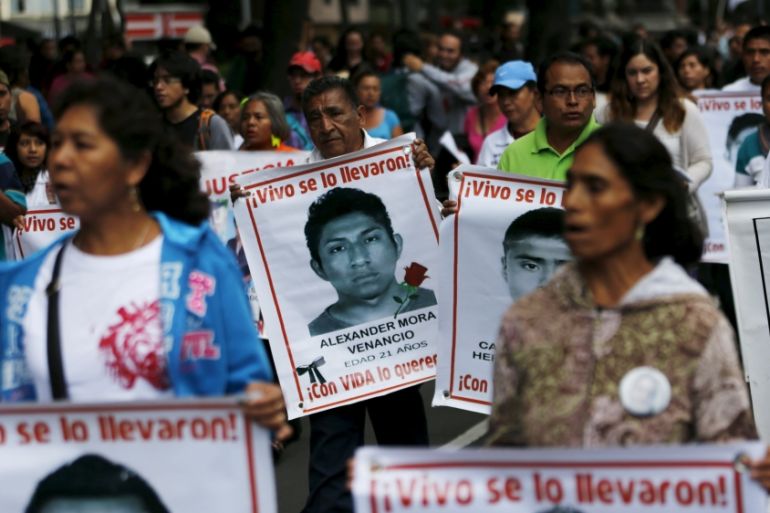Mexico to re-launch missing students investigation
Government agrees to re-start inquiry, using drones and satellite technology, after criticism of initial investigation.

Mexico’s government has announced it will mount a new search in tandem with international experts for the remains of dozens of teaching students who were abducted and apparently massacred a year ago, bowing to widespread domestic and international pressure.
The plan, which includes a new investigations team and the use of drones and satellite technology, could help President Enrique Pena Nieto restore public trust in his government’s ability to act against corruption and a perceived culture of impunity.
Keep reading
list of 4 itemsAustralia’s counterterrorism team arrests seven teens in overnight raids
‘Battlelines’ drawn as jury hears opening remarks in Trump hush money case
Two Mexican mayoral contenders found dead on same day
“There will be a new task force that will re-launch the investigation,” Eber Betanzos, Mexico’s deputy attorney general for human rights, said in Washington on Tuesday at a meeting of the experts looking into the case.
|
|
Mexico’s government says that 43 students were abducted by corrupt municipal police and then handed over to be massacred by a local drug gang that believed the students had links to a rival outfit in the crime-racked, impoverished state of Guerrero.
Forensic experts have already identified the remains of one of the group from a bone fragment and have identified a possible match for a second victim.
But an international team of experts reviewing the case last month questioned the government account of how the gang members incinerated the students’ remains, ground up the charred bodies, and then dumped the ashes in a river, arguing its investigation was sloppy and full of holes.
The government is accepting recommendations by the Inter-American Commission on Human Rights, but will not allow a group of independent experts to directly question military troops about the case.
One of those experts, Angela Buitrago, a Colombian, said the relaunched search will be carried out “with a strategy based on lines laid out by the group, including the use of technology, mapping of clandestine graves and other locations and establishing a path of action agreed upon by the families”.
Buitrago said her group still hopes to question troops because they consider their evidence to be crucial to the investigation.